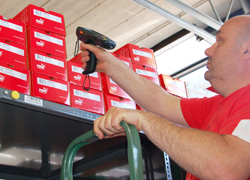As we all know, managing your inventory is one of the key parts in running a successful business. Having too much inventory is not good because inventory depreciates while it just sits on your shelves or in your warehouse. Having not enough inventory is also not a good thing because I don’t think there would be someone who is happy about waiting to buy what they want or need. So main question here would be how do you find that perfect balance?
To control your inventory in an efficient manner, you need to make sure that you do certain things. First of all, you need a good inventory control system without which your simply would not be able to fulfill your orders in an efficient manner. Also, you need make sure you do not have excess inventory, because it gets deducted from company’s bottom line and can lead to you losing money, so you need to make sure that you do not overstock. Another part would be to have a good inventory tracking system that would allow tracking the damaged product and preventing it from getting to a customer.
As an example I would like to share a recent personal experience that I had with PUMA. Few months ago Puma was having their end of the season sale offering 40%-50% off their clothes when you buy it online. As excited as I got, I bought two sweaters and two t-shirts. After a week I got my package with only one t-shirt inside. When I called their customer service I was told that the items that I purchased were out of stock therefore they will refund me my money for the items that I did not receive. It was very unpleasant news to me, but what was more unpleasant was after my phone call I went online and looked at the items that were available for sale, and both sweaters that I wanted and other shirt were still available; nowhere did it say that these items were out of stock. In my opinion, PUMA has a very poor inventory control system that allows them to sell things that simply do not have. Things like this could lead to bad customer relationship, because you just get discouraged when something like that happens.
On the other hand Apple’s inventory management is probably one of the best one out there. Most of the things that you order from Apple’s website come directly from their factory in China, so they do not have to waste money on inventory storage. They also have one of the best delivery systems and we have seen it recently with their iPad launch, when just a few days after announcing the product it was already available for sale, while other companies take weeks.
Has anyone had any similar experience that you can tie to inventory management? Or do you have any suggestions for PUMA to improve their inventory control?
http://www.ehow.com/info_7754850_results-bad-inventory-control.html
http://www.phonearena.com/news/Apples-secret-sauce-for-success-is-inventory-management_id28558

